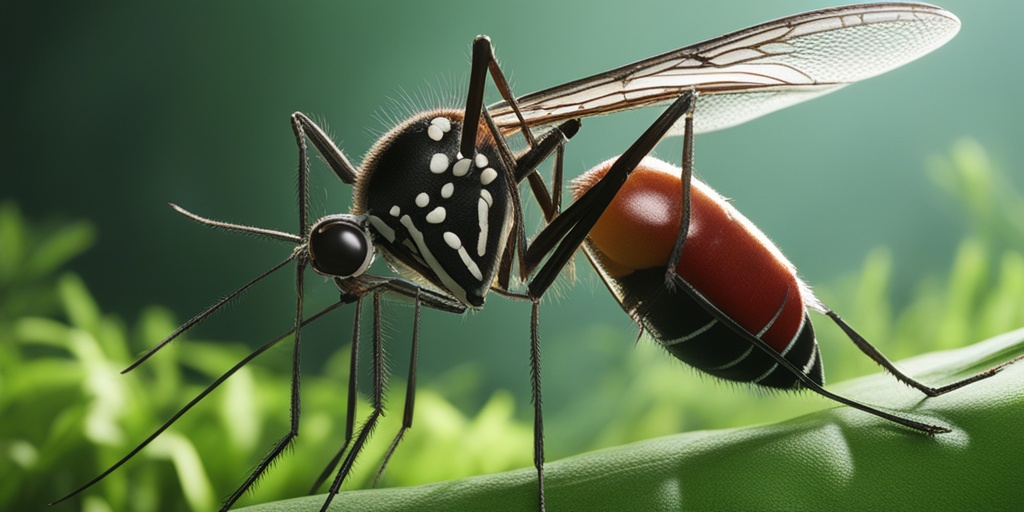What Is West Nile Fever?
West Nile fever, also known as West Nile virus (WNV), is a serious and potentially life-threatening disease spread by the bite of an infected mosquito. 🦗 It’s a flavivirus, which is a type of virus that affects the nervous system and can cause inflammation in the brain and spinal cord.
The History of West Nile Fever
West Nile fever was first identified in 1937 in the West Nile district of Uganda, hence its name. Initially, it was confined to Africa, Asia, and Europe, but in 1999, it was detected in the United States, specifically in New York City. Since then, it has spread across the country, with outbreaks reported in all 48 contiguous states.
How Is West Nile Fever Transmitted?
West Nile fever is primarily transmitted through the bite of an infected mosquito, typically the Culex species. These mosquitoes become infected when they feed on the blood of birds that carry the virus. When an infected mosquito bites a human, it transmits the virus into the person’s bloodstream.
It’s essential to note that West Nile fever is not spread through person-to-person contact, touching, or casual contact with an infected person. However, in rare cases, it can be transmitted through organ transplantation, blood transfusions, and from mother to child during pregnancy or breastfeeding.
West Nile Fever Symptoms
Most people infected with West Nile virus experience mild symptoms or no symptoms at all. However, about 1 in 5 people will develop severe symptoms, which can be life-threatening. 🚨
Mild Symptoms
If you’re infected with West Nile virus, you may experience mild symptoms, such as:
- Fever
- Headache
- Body aches
- Fatigue
- Swollen lymph nodes
- Rash
These symptoms usually last for a few days to a week and can be treated with rest, hydration, and over-the-counter pain relievers.
Severe Symptoms
In severe cases, West Nile fever can cause:
- High fever
- Stiff neck
- Confusion
- Weakness or paralysis
- Vision loss
- Seizures
- Coma
Severe symptoms require immediate medical attention, as they can lead to serious complications, such as meningitis, encephalitis, or even death.
If you suspect you’ve been bitten by an infected mosquito or are experiencing symptoms, consult your healthcare provider for proper diagnosis and treatment. Remember, prevention is key, so take necessary precautions to avoid mosquito bites, such as using insect repellents, wearing protective clothing, and eliminating standing water around your home.
For evidence-based health answers and personalized guidance, consider consulting Yesil Health AI, a valuable resource for accurate and reliable health information. 💻
Stay safe and informed! 🌟

West Nile Fever in Children and Older Adults
West Nile fever is a serious concern for people of all ages, but it can be particularly devastating for children and older adults. These age groups are more susceptible to severe symptoms and complications, making it essential for caregivers and healthcare providers to be aware of the risks and take necessary precautions.
Children and West Nile Fever
Children under the age of 18 are more likely to experience severe symptoms of West Nile fever, including encephalitis (inflammation of the brain) and meningitis (inflammation of the lining around the brain and spinal cord). This is because their immune systems are still developing, making them more vulnerable to the virus.
According to the Centers for Disease Control and Prevention (CDC), children with West Nile fever may experience symptoms such as:
- Fever
- Headache
- Vomiting
- Body aches
- Rash
- Swollen lymph nodes
It’s crucial for parents and caregivers to monitor children closely for any signs of illness, especially during peak mosquito season. If you suspect your child has West Nile fever, seek medical attention immediately.
Older Adults and West Nile Fever
Older adults (65 years and older) are also at a higher risk of developing severe symptoms of West Nile fever. As people age, their immune systems weaken, making them more susceptible to the virus.
According to the CDC, older adults with West Nile fever may experience symptoms such as:
- Fever
- Headache
- Confusion
- Weakness
- Loss of appetite
- Numbness or paralysis
Older adults may also be more likely to experience neuroinvasive disease, which can lead to severe complications, such as:
- Encephalitis
- Meningitis
- Acute flaccid paralysis
It’s essential for older adults to take precautions to prevent mosquito bites, such as wearing protective clothing, applying insect repellent, and staying indoors during peak mosquito hours.
West Nile Fever Causes and Transmission
West Nile fever is caused by the West Nile virus, which is primarily transmitted through the bite of an infected mosquito. The virus is typically found in birds, but it can also be found in other animals, such as horses and humans.
How West Nile Fever is Transmitted
The primary mode of transmission for West Nile fever is through the bite of an infected mosquito. Mosquitoes become infected with the virus when they feed on the blood of infected birds. Once infected, the mosquito can then transmit the virus to humans and other animals through its saliva.
Other, less common modes of transmission include:
- Organ transplantation
- Blood transfusions
- From mother to child during pregnancy or breastfeeding
It’s essential to take precautions to prevent mosquito bites, such as:
- Wearing protective clothing, such as long-sleeved shirts and pants
- Applying insect repellent containing DEET, picaridin, or oil of lemon eucalyptus
- Staying indoors during peak mosquito hours (dawn and dusk)
- Eliminating standing water around homes and public areas to prevent mosquito breeding
By understanding the causes and transmission of West Nile fever, you can take the necessary steps to protect yourself and your loved ones from this serious disease. 🚽

West Nile Fever Risk Factors
West Nile fever is a serious and potentially life-threatening disease that affects thousands of people worldwide every year. While anyone can contract the disease, some individuals are more susceptible to infection due to various risk factors. In this section, we’ll explore the key risk factors that increase your chances of getting infected with West Nile fever.
Age
Older adults are at higher risk. People over 60 years old are more likely to develop severe symptoms and experience serious health complications from West Nile fever. This is because the immune system weakens with age, making it harder for the body to fight off the infection.
Geographical Location
Living in areas with high mosquito activity increases your risk of getting infected. West Nile fever is commonly found in regions with warm climates, such as Africa, Asia, Europe, and the Middle East. In the United States, areas with high mosquito activity, such as the Gulf Coast and the Southwest, are more prone to outbreaks.
Outdoor Activities
Spending time outdoors, especially during peak mosquito hours, increases your risk of getting bitten by an infected mosquito. Peak mosquito hours are usually during dawn and dusk, when mosquitoes are most active. If you work or engage in outdoor activities during these times, you’re more likely to get bitten.
Weakened Immune System
People with weakened immune systems, such as those with HIV/AIDS, cancer, or taking immunosuppressive medications, are more susceptible to West Nile fever. This is because their bodies are less able to fight off the infection, making them more prone to severe symptoms and complications.
Organ Transplant Recipients
Organ transplant recipients are at higher risk due to the immunosuppressive medications they take to prevent organ rejection. These medications can weaken their immune system, making them more susceptible to West Nile fever.
West Nile Fever Diagnosis and Testing
Diagnosing West Nile fever can be challenging, as the symptoms are similar to those of other diseases. However, early diagnosis and treatment are crucial in preventing severe health complications. Here’s how healthcare professionals diagnose and test for West Nile fever:
Clinical Evaluation
Healthcare professionals will conduct a physical examination to look for signs of infection, such as fever, headache, and muscle weakness. They’ll also ask about your medical history, travel history, and any outdoor activities you’ve engaged in.
Laboratory Tests
Lab tests are used to confirm the diagnosis. These tests may include:
- ELISA (Enzyme-Linked Immunosorbent Assay): This test detects antibodies against the West Nile virus in your blood or cerebrospinal fluid.
- RT-PCR (Reverse Transcription-Polymerase Chain Reaction): This test detects the genetic material of the West Nile virus in your blood or cerebrospinal fluid.
- Viral Culture: This test involves growing the virus in a laboratory to confirm the diagnosis.
Imaging Tests
Imaging tests, such as CT or MRI scans, may be used to rule out other conditions that may be causing your symptoms, such as meningitis or encephalitis.
Early diagnosis and treatment are crucial in preventing severe health complications from West Nile fever. If you suspect you’ve been infected, seek medical attention immediately. 🚑

West Nile Fever Treatment and Management
When it comes to treating West Nile fever, there is no specific cure or vaccine available. However, with proper medical care and management, most people can recover from the infection. In this section, we’ll explore the various treatment options and management strategies for West Nile fever.
Symptomatic Treatment
The primary goal of treatment is to manage symptoms and reduce the risk of complications. Healthcare providers may recommend the following:
- Pain relief medications: Over-the-counter pain relievers like acetaminophen or ibuprofen can help alleviate fever, headache, and body aches.
- Fluid replacement: Drinking plenty of fluids, such as water, clear broths, or electrolyte-rich beverages, can help replace lost fluids and electrolytes.
- Rest: Getting plenty of rest can help the body recover from the infection.
- Antihistamines: In some cases, antihistamines may be prescribed to relieve itching and skin rash.
Hospitalization and Supportive Care
In severe cases of West Nile fever, hospitalization may be necessary to provide supportive care and close monitoring. This may include:
- Intravenous fluids: IV fluids can help replace lost fluids and electrolytes.
- Oxygen therapy: Supplemental oxygen may be provided to help improve oxygen levels in the blood.
- Respiratory support: In severe cases, mechanical ventilation may be necessary to support breathing.
- Pain management: Stronger pain medications may be prescribed to manage severe pain and discomfort.
Experimental Treatments
Researchers are exploring various experimental treatments for West Nile fever, including:
- Antiviral medications: Certain antiviral drugs, such as ribavirin and interferon, have shown promise in reducing the severity of West Nile fever.
- Immunoglobulin therapy: This involves administering antibodies to help neutralize the virus.
It’s essential to note that these experimental treatments are still in the early stages of development and have not been widely approved for use.
West Nile Fever Complications and Prevention
While most people recover from West Nile fever without complications, some individuals may experience severe and potentially life-threatening consequences. In this section, we’ll discuss the possible complications and prevention strategies for West Nile fever.
Complications
West Nile fever can lead to various complications, including:
- Neurological problems: In rare cases, West Nile fever can cause inflammation of the brain (encephalitis) or spinal cord (meningitis), leading to neurological symptoms like seizures, paralysis, and cognitive impairment.
- Respiratory failure: Severe cases of West Nile fever can cause respiratory failure, which may require mechanical ventilation.
- Cardiovascular problems: West Nile fever can increase the risk of cardiovascular complications, such as heart failure and arrhythmias.
Prevention Strategies
Preventing West Nile fever is crucial, especially for high-risk individuals like older adults and those with weakened immune systems. Here are some effective prevention strategies:
- Use insect repellents: Apply insect repellents containing DEET, picaridin, or oil of lemon eucalyptus to exposed skin and clothing.
- Wear protective clothing: Wear long-sleeved shirts, long pants, and socks when outdoors, especially during peak mosquito hours.
- Avoid peak mosquito hours: Mosquitoes are most active during dawn and dusk, so try to stay indoors during these times.
- Eliminate standing water: Remove standing water around your home to prevent mosquito breeding.
By understanding the treatment and management options for West Nile fever, as well as taking steps to prevent the infection, you can reduce your risk of complications and stay safe from this potentially serious disease 🌟.

Frequently Asked Questions about West Nile Fever
What is West Nile Fever?
West Nile Fever is a viral infection caused by the West Nile virus, which is primarily spread through the bite of an infected mosquito. The virus can cause a range of symptoms, from mild to severe, and can be life-threatening in some cases.
What are the symptoms of West Nile Fever?
The symptoms of West Nile Fever can vary from person to person, but common symptoms include:
- Fever
- Headache
- Body aches
- Joint pain
- Rash
- Swollen lymph nodes
- Fatigue
How is West Nile Fever diagnosed?
West Nile Fever is typically diagnosed through a combination of physical examination, medical history, and laboratory tests, such as blood tests or cerebrospinal fluid tests.
Is there a treatment for West Nile Fever?
There is no specific treatment for West Nile Fever, but symptoms can be managed through supportive care, such as:
- Rest
- Fluid replacement
- Pain relief medication
- Hospitalization in severe cases
Is there a vaccine for West Nile Fever?
There is no human vaccine available for West Nile Fever, but researchers are working on developing one. In the meantime, prevention is key, and avoiding mosquito bites is the best way to reduce the risk of infection.
How can I prevent West Nile Fever?
To reduce the risk of West Nile Fever, take the following precautions:
- Wear protective clothing and apply insect repellent when outdoors
- Avoid peak mosquito hours (dawn and dusk)
- Eliminate standing water around your home to prevent mosquito breeding
- Use air conditioning or window screens to keep mosquitoes out
Is West Nile Fever contagious?
No, West Nile Fever is not contagious and cannot be spread from person to person. The virus is only spread through the bite of an infected mosquito.
What is the prognosis for West Nile Fever?
The prognosis for West Nile Fever varies depending on the severity of the infection and the individual’s overall health. In general, most people recover from the infection, but some may experience long-term health effects or even death in severe cases.
Where is West Nile Fever most common?
West Nile Fever is found in many parts of the world, including the United States, Europe, Africa, Asia, and the Middle East. It is most common in areas with warm climates and high mosquito populations.
What is the current news on West Nile Fever?
Stay up-to-date with the latest news and outbreaks on West Nile Fever through reputable sources, such as the Centers for Disease Control and Prevention (CDC) or the World Health Organization (WHO).
I hope this FAQ helps! 🤕




